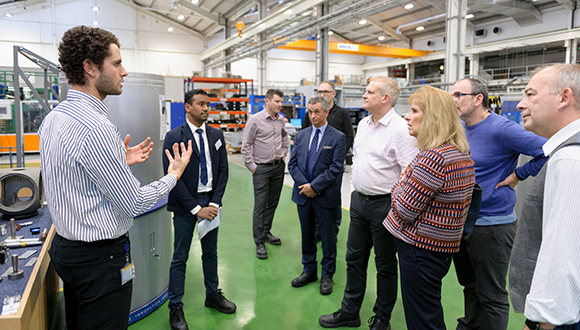Fri, 28 July, 2023
Learn how Pedro's industry-focused academia prepared him for a position at TWI
Cambridge, United Kingdom - Pedro de Sousa Santos is a mechanical engineer who received his MSc degree from the Faculty of Science and Technology at the New University of Lisbon (FCT-UNL). He decided to pursue his PhD after completing his MSc thesis on the Friction Stir Welding process parameter optimisation. The project aimed to produce tailor-welded blanks for lightweight transport applications, and was sponsored by Innovate UK (LightBlank) as part of an industrial placement at TWI in Cambridge.
During his placement, Pedro's section manager was impressed with his performance and encouraged him to sign-up as an NSIRC PhD Studentship. Pedro says that opportunities for a fully funded and paid PhD are rare in Portugal, so he jumped at the opportunity to engage in a postgraduate academic study that was based within and focused on industry-relevant innovation.
Development of the Refill Friction Stir Spot Welding (RFSSW) Process for Lightweight Aerospace Applications
Pedro's PhD was funded by the TWI Core Research Programme, awarded by Coventry University, and focused on the development of the Refill Friction Stir Spot Welding (RFSSW) process for lightweight aerospace applications. During his research, Pedro found a gap in the study of the relationship between the tooling components and the performance of the joints. He built on this gap, and his PhD research proposal focused on the latest friction stir welding (FSW) process, RFSSW, which had not yet seen any real industrial applications. As a result of his PhD work, he is now one of the most knowledgeable experts on this subject, having recently completed his PhD.
In 2021, Pedro's research from his PhD was published in the international materials joining journal, 'Welding in the World.' The results of this study showed that the mechanical properties of the welds produced using RFSSW without interfacial sealant, were closely matched with the established joining technology for the aerospace industry, rivet joints.
The use of interfacial sealants, commonly used in the aerospace sector, improved the static and mechanical strength of the welds, surpassing the benchmark values for riveted joints. Pedro's work showcases the potential of this technology in aerospace applications and for uses in other industrial sectors with safety-critical requirements.
The research also confirm the suitability of the RFSSW joining process in the pursuit of more efficient vehicles, as it allows for the reduction of vehicle weight by eliminating the need for mass-adding fasteners. This technology enables the structural optimisation of structural elements and down gauging.
The final results from Pedro's PhD were published in a paper, 'Refill friction stir spot welding of aerospace alloys in the presence of interfacial sealant' via SpringerLink.
The Value of an Industry-led PhD Experience
NSIRC's PhD programme provided Pedro with a great opportunity to meet professionals and technical experts and to experience a variety of engineering processes and technologies. To Pedro, he describes his experience as a three-year job interview, during which the employer can see a candidate's progression from their first year to the end of their full-time PhD, and their development and the expansion of their skills is clearly visible.
His experiences throughout the course, some of which did not go as planned, but others where he could, showed considerable skill and competence, and allowed Pedro to further his professional development.
Pedro, like all NSIRC doctoral students, had access to opportunities like workshops, conferences, and other TWI events. Together, they enriched his experience, background knowledge, and work-life balance, giving him valuable skills and industry training. He credits NSIRC and TWI with making him both a better engineer and professional.
 Pedro presented the Refill Friction Stir Spot Welding (RFSSW) facility at TWI, to senior academic from Coventry University. Photo: TWI Ltd
Pedro presented the Refill Friction Stir Spot Welding (RFSSW) facility at TWI, to senior academic from Coventry University. Photo: TWI Ltd
After completing his postgraduate degree, Pedro chose to stay with TWI, accepting his current post as a Senior Project Leader, rather than move to a different company. His studies gave him experience working with many of the technicians and experts at TWI, as well as project management and systems skills. He also notes that the professional relationships he had cultivated during working days, and the attractive location of Cambridge, encouraged him to stay at the company that helped him develop as a doctor of philosophy.
Within his job role at TWI, Pedro has been actively involved in diverse technologies and cutting-edge topics including 'Friction Welding Processes for Floating Solar Application,' and well as award-winning work for the Non-metallic Innovation Centre, a partnership between the Saudi Aramco Technologies Company, TWI and ADNOC.
In conclusion, Pedro's journey from academia to industry is an inspiring one. His focus, dedication, and hard work have led to groundbreaking research in the field of friction stir welding. His experience at NSIRC and TWI has given him valuable skills and industry training. Pedro's story is a testament to the benefits of pursuing postgraduate academic study alongside professional engineering experience.